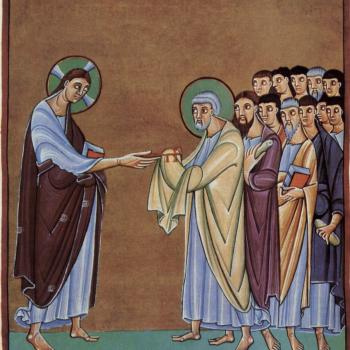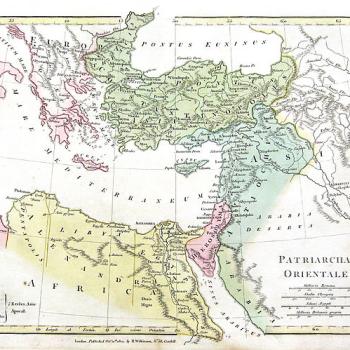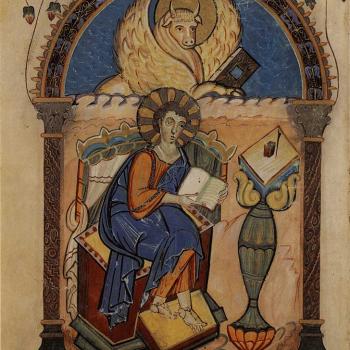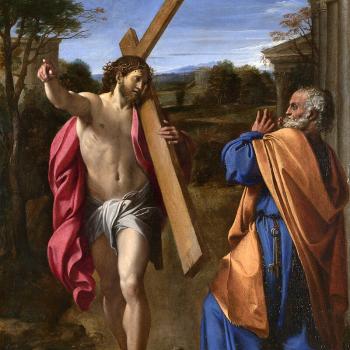
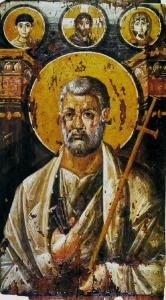 Icon of St. Peter, St. Catherine’s Monastery, 6th c.
Icon of St. Peter, St. Catherine’s Monastery, 6th c. (Wikimedia Commons)
Theodore Abu Qurrah was the Melkite Bishop of Haran (Upper Mesopotamia) who lived in the 9th century A.D. As such, he found himself living under Muslim rule. Besides being one of the first Christian authors to write in Arabic, he was also one of the first of these to defend Christianity from Islamic writers who sought to disprove it.[1] In the East, the three largest groups of Christians were Melkites, Nestorians, and Monophysites (now known as Miaphysites).[2] In this context, “Melkites” refers to those Christians who upheld the Christology of Pope St. Leo I and the Council of Chalcedon (451) that lived in the East. Keeping in mind that Theodore is writing in the time before the East-West Schism that resulted in the separation of what we now call Catholic and Eastern Orthodox Christians, he was (from the Catholic point of view), a Catholic Bishop. “Nestorians” then, were those Christians who rejected the Council of Ephesus (431), and thus departed from Catholic unity. They exist today and are known as the Assyrian Church of the East. “Monophysites” refers to those Christians who rejected the Council of Chalcedon, also departing from Catholic unity. They exist today and are typically referred to as Oriental Orthodox Christians (Copts, Ethiopians, etc. in communion with the non-Chalcedonian Patriarch of Alexandria.)
Because of his historical and demographic context, Theodore concerned himself first with defending Christianity, and more specifically, with determining which was the true Church. To answer that question, he used the Bishop of Rome as the reference point. Below you will see him deploy the three Petrine texts from the Gospels (Mt. 16: 18, Lk. 22:32, Jn. 21) that the Catholic Church has historically referenced in defending its teaching on the office of the Papacy.
This particular text is translated from Arabic into English by John C. Lamoreaux, and in reference to the brackets, he notes that, “[o]ne wonders whether the bracketed materials here and in what follows are not scribal interpolations and emendations – in short, attempts to bring Theodore more nearly into the fold of later [O]rthodox ecclesiology. Their presence clearly offends against the sense of Theodore’s argument, which requires the bishop of Rome alone as guarantor of the six councils [i.e. the first six Ecumenical Councils].”[3]
Here is the text:
“You should understand that the head of the apostles was St. Peter, he to whom Christ said, ‘You are the rock; and on this rock I shall build my church, and the gates of hell will not overcome it.’ After his resurrection, he also said to him three times, while on the shore of the sea of Tiberias, ‘Simon, do you love me? Feed my lambs, rams, and ewes.’ In another passage, he said to him, ‘Simon, Satan will ask to sift you like wheat, and I prayed that you not lose your faith; but you, at that time, have compassion on your brethren and strengthen them.’ Do you not see that St. Peter is the foundation of the church, selected to shepherd it, that those who believe in his faith will never lose their faith, and that he was ordered to have compassion on his brethren and strengthen them? As for Christ’s words, ‘I prayed for you, that you not lose your faith; but you, have compassion on your brethren, at that time, and strengthen them,’ we do not think that he meant St. Peter himself [and the apostles themselves]. Rather, he meant nothing other than the holders of the seat of St. Peter, that is, Rome, [and the holders of the seats of the apostles].
Just as when he said to the apostles, ‘I am with you always, until the end of the age,’ he did not mean just the apostles themselves, but also those who would be in charge of their seats and their flocks; in the same way, when he spoke his last words to St. Peter, ‘Have compassion, at that time, and strengthen your brethren; and your faith will not be lost,’ he meant by this nothing other than the holders of his seat. Yet another indication of this is the fact that among the apostles it was St. Peter alone who lost his faith and denied Christ, which Christ may have allowed to happen to Peter so as to teach us that it was not Peter that he meant by these words. Moreover, we know of no apostle who fell and needed St. Peter to strengthen him. If someone says that Christ meant by these words only St. Peter himself [and the apostles themselves], this person causes the church to lack someone to strengthen it after the death of St. Peter. How could this happen, especially when we see all the sifting of the church that came from Satan after the apostles’ death? All of this indicates that Christ did not mean [them] by these words. Indeed, everyone knows that the heretics attacked the church only after the death of the apostles – Paul of Samosata, Arius, Macedonius, Eunomius, Sabellius, Apollinaris, Origen, and others. If he meant by these words in the gospel only St. Peter [and the apostles themselves], then after [them] the church would have been deprived of comfort and would have had no one to deliver her from those heretics, whose heresies are truly ‘the gates of hell,’ which Christ said would not overcome the church. Accordingly, there is no doubt that he meant by these words nothing other than the holders of the seat of St. Peter, who have continually strengthened their brethren and will not cease to do so as long as this present age lasts.”
[4]
I hope you have enjoyed this post. Please consider subscribing to the e-mail list to be notified about recent posts.
[1] John C. Lamoreaux, Theodore Abu Qurrah (Library of the Christian East Vol. I), (Brigham Young University Press, Provo, UT: 2005), xii.
[2] Ibid.
[3] Ibid. Pg. 68 (emphasis mine.)
[4]Ibid. Pgs. 68-69



